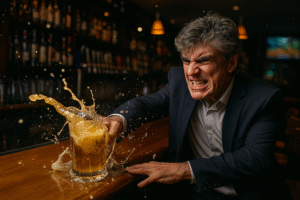June 24, 2025, marks two years of sobriety for me. Funny, I didn’t use the “sober” word initially; it was just “I quit alcohol.” However, since then I’ve come to appreciate the sober lifestyle, and therefore the word. I feel it conveys a positive attitude, but more so it is representative of coming to reality with the truth that gripped me for many years.
One aspect of this journey has been the number of former drinkers I have encountered who say enthusiastically, without reservation, that it was one of the best decisions they have ever made. In fact, I have yet to meet a former drinker who regrets quitting. The change in clarity in life, the enhanced perception of purpose, the shift in focus of priorities and use of discretionary time and money—all are unparallelled.
who say enthusiastically, without reservation, that it was one of the best decisions they have ever made. In fact, I have yet to meet a former drinker who regrets quitting. The change in clarity in life, the enhanced perception of purpose, the shift in focus of priorities and use of discretionary time and money—all are unparallelled.
These positive directional shifts don’t come without some darkness. I am more observant and aware of how alcohol slowly kills people. I’m not referring to physical death though inevitably alcohol leads down that path. One acquaintance from the early 2000s, a heavy drinker and functional alcoholic and by all measures successful in his career, said to his wife while in the ICU “how did I get here?” followed quickly by “I know how.” He was the second dead human body of someone I knew well that I had seen; his skin so yellow, as if someone had run a giant highlighter over all his skin. He died eyes shut, mouth open.
No, here I refer to the gradual death of the true self, the person sacrificed to the alter of alcohol. Like a lobster slowly boiled to death, those so enslaved don’t recognize the gradual change to their core self. To them, all is fine, but to others, the change becomes noticeable, then impossible to dispute. The person dies to others without realizing they are ill.
I first encountered this phenomenon as a boy with my grandmother. To me, she had been the stereotypical kind grandmother type. I was shocked, confused, and scared the first time I saw a completely opposite person. Parents and others often hide stress of adult living from children, nor can the young brain process adult problems. As I came to understand later, she turned to alcohol under times of stress.
For years my mother warned me of the alcoholic gene, a biological predisposition for alcohol abuse (and self-medication is abuse), that she believes runs in her family. In my grandmother’s case, her physician had suggested a glass of wine in the evening to deal with the pain of losing her husband. If my mother was correct, that simple statement led to years of self-medication because of a vulnerability we carry.
I could see it was a possible risk for me, but I wasn’t bothered. I just saw it as part of who I was. I’m pretty much 100% German (or from that general area), and I love beer. That would seem to fit together. Besides, I believed alcohol consumption was a rite of passage of my early adult years in the 1980s. Pop culture at the time (for example, Animal House) certainly supported that narrative. I wanted to be a “cool kid” in college, likely to subconsciously compensate for social awkwardness in high school.
It worked, but it was, in hindsight, an illusion. I wasn’t being myself. I hid who I truly was, the insecure but authentic Greg, in favor of the party Greg. The latter version of me proved to be much more popular. I think that’s how alcohol slowly kills the true nature of a person. Often the image created is more liked by others and therefore more secure to the drinker. The problem is obvious; that persona is fake, and ultimately both unsustainable and unfulfilling.
For me, it was initially the pain stemming from insecurity, then other pain—failure, betrayal, divorce, stress…I could go on. I didn’t realize that I had inherited the alcohol gene. More alcohol dulled the pain, and the cycle repeated. What else could that path lead to besides a web of false relationships? Hiding our true selves prevents us from building authentic connections. I see this much clearer in hindsight. Eventually the true self, suppressed by the personal alcohol or other drugs can provide, is in danger of ceasing to exist—spiritually, mentally, and eventually physically.
 Unlike my functional alcoholic acquaintance of 20 plus years ago, that doesn’t have to be the end game though. Sometimes a health condition caused or worsened by alcohol consumption shakes one back to reality; that’s what happened to me. As I wrote about last year, an AFib warning from my Apple Watch early in the morning of June 24, 2023, was enough of a shaking from God for me to finally put it down for good. I decided that people may like or dislike the non-drinking me, but it would be the real me.
Unlike my functional alcoholic acquaintance of 20 plus years ago, that doesn’t have to be the end game though. Sometimes a health condition caused or worsened by alcohol consumption shakes one back to reality; that’s what happened to me. As I wrote about last year, an AFib warning from my Apple Watch early in the morning of June 24, 2023, was enough of a shaking from God for me to finally put it down for good. I decided that people may like or dislike the non-drinking me, but it would be the real me.
Today I am the authentic Greg. What you see is what you get. I have, only by the saving grace of God, been delivered from the shackles of alcohol misuse. I believe occasional alcohol use is fine (though likely no longer for me ever). However, when used for self-mediation, a line is crossed. The problem is most don’t see that they crossed a line, or even that such a line exists. I know I didn’t, not until I started to be brutally honest with myself.
If you’ve seen yourself somewhere in this essay, I hope you have come to realize that enslavement doesn’t equate to losing the game. Everyone can find the way back to their authentic self, but you have to want to get well. You can drop the barriers and will likely be amazed how many people will support you. As I said; I have yet to meet someone who regrets quitting alcohol, or any other addiction that has shackled them.
A final word of consideration, though: be prepared to lose relationships. At least that is what it will appear as, but remember relationships based on masks, never seeing the identity kept hidden, are false. When you cast off what they knew you as, they may or may not like what they see. That’s okay. Often changing your circle of influencers is necessary when having the courage to reveal and live as your true self. Choosing authenticity is freedom. Choosing freedom is life.